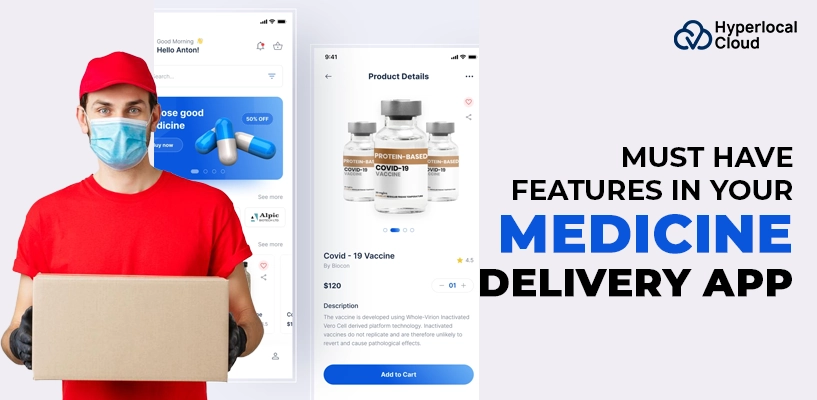Must-Have Features in Your Medicine Delivery App

Why must necessities lag when everything is online these days? The medicine industry is one of the necessities almost every age group requires. Buying medicine at a physical pharmacy store can cause inconveniences, like you might have to wait in a long line or be unable to get the medicine you need. But with the medicine delivery app, this is different. You can get your medications quickly and easily using an app that delivers medications.
This article will discuss the must-have features of medicine delivery apps. But before that, let’s look at the other important factors of the medicine delivery business.
Why Should You Spend Your Time and Money on The Medicine Delivery App?
Online pharmacies are becoming increasingly popular because they are easy to use, have low prices, have a large selection, and provide high-quality service. Also, the skyrocketing growth of smartphone use is rocket fuel for the growth of medicine delivery services.
Noteworthy Statistics Of The Medicine Industry
The online pharmacy market is expected to reach $210.35 billion by 2028, a CAGR of 17.83% from 2021 to 2028.
By the end of the year, there will be 21.54% of users, and by 2026, there will be 27.74%.
That means each user brings in an average of $13.73 per month.
In 2016, there were 41,552 health apps on the Google Play and Apple App Store. Experts say that number will go up to 1,588,750 by the year 2025.
Medicine Delivery App Development – Business Models
Here are the most common ways to run a medicine delivery service so that you can choose the best one for you.
The Direct-To-Consumer Model
The Direct to Consumer business model does work like it says it will. Drug companies have made a customer service app for online pharmacies. This is a less common way pharmaceutical companies do business, but it has worked for some.
This cuts out the middleman and saves them money on fees, helping them become profitable. It also helps them get their supply chain in order.
Medicine Delivery Application For A Store
This is one of the main ways that many apps work. Customers expect vendors to accept online prescriptions and orders from them. When a pharmacy gets a prescription, the first thing they do is check to see if they have the medicine in stock. They give the client a report on the current stock. The final step is for the customer to pay for the order however they prefer.
Partnership With Chemist Shops
This type of business model is used by almost all of the apps that deliver medicine. This model is much more flexible than the other two. There’s no reason for them to have any particular medicine on hand. Instead, they deal with several pharmacies in the same area that different people own. When a customer makes an order, the closest pharmacy checks to see if they have what they need; if they don’t, the order is sent to the closest location where it can be filled.
Both sides sign contracts in this type of business model. After that, they will be able to work together.
Top Medicine Delivery Applications
Here are the best apps for getting medicine to people:
| Epocrates | 1mg | Doximity |
| Netmeds | Skyscape | Medplus Mart |
| Medlife | Practo | Pepid |
Who Can Help You with Medicine App Development?
You need a strong team of programmers to make the best pharmacy app. These people are part of this group:
App developers: App developers are experts in their field and will make your medicine delivery app using the latest tools and technologies. The app must work well on the operating system and chosen platform.
Quality Analysts and Testers: Professional quality analysts and testers look for bugs by looking at an app’s code, infrastructure, and control flow.
UI Designers: The job of user interface designers is to make apps look nice and attract people to use them. A good app layout keeps the user interested for longer.
Marketing Professionals: Marketing experts will get people interested in your app for the delivery business. They will also turn people who might be potential customers into loyal customers for life.
Leverage A Smart And Reliable Medicine Delivery App
Must-Have Features Of Medicine Delivery Apps
There are multiple features of a medicine delivery app that can take businesses to the next level of success; here are some of them:
Customers App Features
Let us have a look at some of the customer app features:
Sign In and Sign Up: Users should be able to log in quickly and easily, and they should be able to change their credentials to suit their needs. People should be able to sign up for the app using their existing social media accounts. Email addresses or cell phone numbers can be used later to get the login information.
Profile Management: The app’s user experience can be improved by letting people make profiles. The customer’s address, order history, prescription records, and billing information are kept in these profiles.
Upload Prescriptions: Before filling orders, customers must be able to upload their prescriptions for pharmacists to review. So, connecting their phone’s gallery to their account is the easiest way for them to upload the prescription.
Filters for Category Search: The app needs search filters and categories for each medical issue so that users can quickly find the medicines they need.
Medicine Details: On a medicine delivery mobile app, each medicine or drug should have information like the manufacturing date, expiry date, brand, manufacturer, price, salts, etc.
Expansive Search: Since the user’s preferred drug might be challenging, they should be able to find good alternatives.
Chemist Or Pharmacy Store App Features
Let us have a look at some of the important store app features:
Keep Track of Drug Information: If a pharmacy owner or pharmacist wants to add or remove medications from the app’s database, he should be able to do so without help.
Order Notifications and Tracking: This feature lets the pharmacies get a text or pop-up message whenever the user orders any medicine. This speeds up the time to process orders.
Digital Prescriptions: The app should allow the pharmacist to see the prescriptions users have uploaded within the app.
Manage Discounts: Customers are more likely to buy from you again if you give them special deals for loyalty.
Order Management: HIPAA says that pharmacists must be able to organize orders and handle things like processing orders, returns, and refunds.
Verify Funding: The pharmacy should get all payments through the app and be able to track them easily.
Check out Reviews and Opinions: Pharmacies should be able to see all ratings and reviews that customers have left, giving them important information about how their services and products are liked.
List Similar Medicines: When a certain drug is out of stock, a pharmacist should be able to tell customers where they can find similar drugs.
Delivery Person App Features
Here are some of the important delivery person app features:
Courier Profile: It should have the name, address, and phone number of the delivery boy, as well as a list of deliveries he made.
Push Messages: Push notifications are a great way to inform the delivery boy of a new order.
System For Monitoring: The delivery boys should have GPS to find the customer quickly and get the order to them.
Delivery Updates: At each step, he should be able to update the status of the medicine delivery so that all information remains up to date.
Admin Panel Features
The admin panel will have all the important features to monitor the entire business.
Stock Management: With this function, the administrator will always know how many items are in stock. Also, the admin will be notified when certain medicines will expire, thus resulting in better stock management.
Marketing & Promotion Tools: Admin should be able to run campaigns, allowing them to reach a wider audience. This facilitates communication with more pharmaceutical companies.
Manage Suppliers And Users: This feature enables the app’s administrator to manage the manufacturers, suppliers, and users through their online profiles on the app.
Track ROT Profits: It enables admins to track their earnings anytime. It shows reports in different modes for each month, quarter, or year.
Access & Generate Reports: To make an accurate report, the admin needs to know everything about how the app works.
Advanced Features Of Medicine Delivery App
The medicine delivery app will also have a list of advanced features embedded in it as per the latest market trends. Let’s have a look at some of them:
Multilingual Capabilities: With the multilingual feature, the app works in multiple languages, so people can use it in their native language and still get the necessary information.
Shipment Tracking: Offers a tracking number with each purchase so customers can see where their package is in transit.
In-app Chat: Users can seek the support they need from the pharmacist and the delivery boy within the app.
AI-enabled: AI is making the user experience better in many ways, such as through image search, food recommendations, and voice controls.
Loyalty Program: With each purchase, users can earn points toward rewards that encourage them to buy again.
EHR Integrated Customer Profile: Prescriptions from the user’s Electronic Health Records profile can be used to figure out how a patient’s health is doing.
Document Management: The app should make it easy for people who use it often to organize their prescriptions.
Lab Aggregation: Lab data collection makes it easy for customers to get information about nearby pathologies, lab information, and price estimates.
Number Masking: Users’ privacy is protected by “number masking,” so only the delivery person and the admin can see their phone numbers.
Multi-lingual Support: Customers come from all over the world and speak many different languages and religions; therefore, it’s important that the app can respond to their questions in their native tongue.
In-App Document Scanner: Customers who want to share their prescriptions will find the built-in scanner very useful because it will make it easy for them to upload their prescriptions.
Electronic Prior Authorization: Connecting patient records to the EPA lets healthcare providers get prior authorizations immediately.
Multi-currency Payment Support: The app should let users pay in any currency.
Embedding CRM Systems: A company’s success and growth depend on how well it manages customer relationships.
Guaranteed ROIs Through Our Top-Notch Medicine Delivery App
Cost of Developing a Medicine Delivery App
Look at the main things that affect how much an app for delivering medicines costs:
Development Platform: Which platform do you choose to build your e-pharmacy app on? This could be a mobile app made for iOS, Android, or Windows or a hybrid app that works on multiple operating systems.
Development Timeline: How quickly you need an app made affects how much you’ll have to pay to make it.
Development Partner Geo-Location: Where your development team is based greatly affects how much your pharmacy app will cost. You can expect to pay anywhere from $ 140 to $ 260 per hour for a developer in the US or UK, £ 80 to £ 120 per hour in Europe, and $ 20 to $ 35 per hour for the least expensive app developers in Asia.
Features and Functionality: App development cost will also depend greatly on what features and functions you want it to have. The app will cost more if it has more features.
Integration with Third-Party Platforms: Adding custom features means paying more to integrate APIs from different third-party platforms.
Thus, a Minimum Viable Product (MVP) is estimated to cost between $16,000 and $30,000.
Creating a medicine delivery app that can compete with the top ones on the market can cost more than $2,000, depending on how many third-party integrations are needed and how many features are included. This app could help your business grow in a big way.
Conclusion
Due to the huge demand for medicines, people want to get them easily at home. The features of the medicine delivery app, such as easy user registration, prescription upload, and real-time order tracking, make it the talk of the town. High convenience, easy access, and overall customer satisfaction make these apps suitable for every age group, especially older adults and people with disabilities who are in dire need of medicine but cannot reach a pharmacy.
As you can see, the demand for medicine delivery apps is growing rapidly. Hire a medicine delivery app development company if you want to get the best out of this billion dollar industry.





